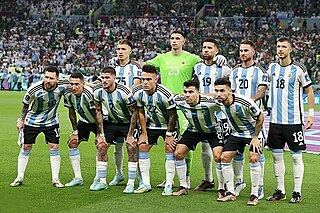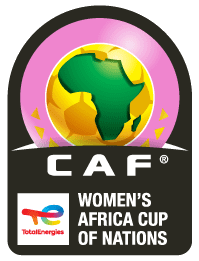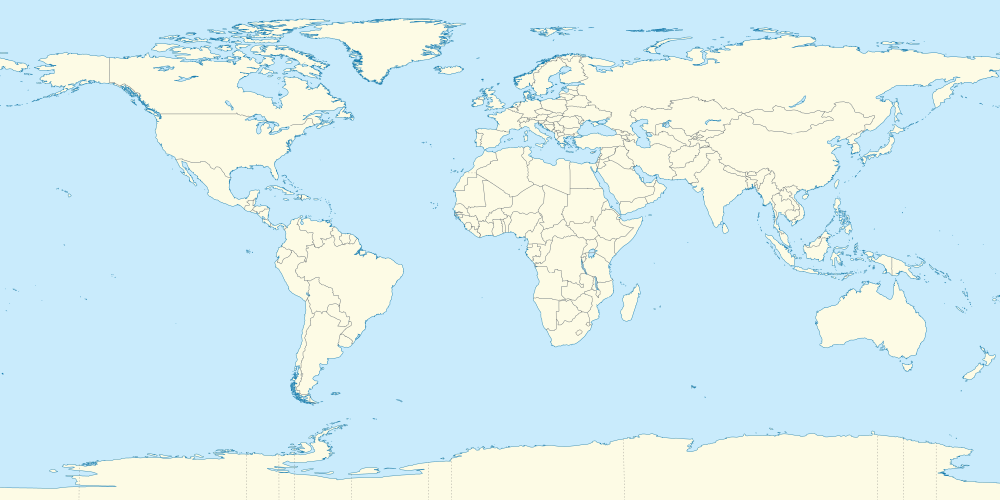
The FIFA World Cup, often called the World Cup, is an international association football competition among the senior men's national teams of the members of the Fédération Internationale de Football Association (FIFA), the sport's global governing body. The tournament has been held every four years since the inaugural tournament in 1930, with the exception of 1942 and 1946 due to the Second World War. The reigning champions are Argentina, who won their third title at the 2022 tournament.

The FIFA Women's World Cup is an international association football competition contested by the senior women's national teams of the members of Fédération Internationale de Football Association (FIFA), the sport's international governing body. The competition has been held every four years and one year after the men's FIFA World Cup since 1991, when the inaugural tournament, then called the FIFA Women's World Championship, was held in China. Under the tournament's current format, national teams vie for the remaining 31 slots in a three-year qualification phase. The host nation's team is automatically entered as the first slot. The tournament, called the World Cup Finals, is contested at venues within the host nation(s) over about one month.

The AFC Asian Cup is the primary association football competition contested by the senior men's national teams of the members of the Asian Football Confederation (AFC), determining the continental champion of Asia. It is the second-oldest continental football championship in the world after Copa América. The winning team becomes the champions of Asia and until 2015 qualified for the FIFA Confederations Cup.

The CONCACAF Gold Cup is the main association football competition of the men's national football teams governed by CONCACAF, determining the continental champions of North America. The Gold Cup is held every two years. The tournament succeeded the CONCACAF Championship (1963–1989), with its inaugural edition being held in 1991.

The OFC Men's Nations Cup, known as the OFC Nations Cup before the 2024 edition, is the primary association football competition contested by the senior men's national teams of the members of the Oceania Football Confederation (OFC), determining the continental champion of Oceania. The winning team became the champion of Oceania and until 2016 qualified for the FIFA Confederations Cup.

The Oceania Football Confederation (OFC) is one of the six continental confederations of international association football. The OFC has 13 members, 11 of which are full members and two which are associate members not affiliated with FIFA. It promotes the game in Oceania and allows the member nations to qualify for the FIFA World Cup.

The Confederation of North, Central America and Caribbean Association Football, abbreviated as CONCACAF, is one of FIFA's six continental governing bodies for association football. Its 41 member associations represent countries and territories mainly in North America, including the Caribbean and Central America, and, for geopolitical reasons, three nations from the Guianas subregion of South America-Guyana, Suriname, and French Guiana. The CONCACAF's primary functions are to organize competitions for national teams and clubs, and to conduct the World Cup and Women's World Cup qualifying tournaments.

The Asian Football Confederation (AFC) is the governing body of association football, beach soccer, and futsal in most countries and territories in Asia. The AFC was formed in 1954. It has 47 members. The Asian Ladies Football Confederation (ALFC) was the section of AFC that managed women's association football in Asia. The group was independently founded in April 1968 in a meeting involving Taiwan, British Hong Kong, Malaysia and Singapore. In 1986, ALFC merged with AFC.

The Confederation of African Football (CAF) is the administrative and controlling body for association football, beach soccer, and futsal in Africa. It was established on 8 February 1957 at the Grand Hotel in Khartoum, Sudan by the national football associations of: Algeria, Egypt, Ethiopia, Nigeria, and South Africa. following formal discussions between the aforementioned associations at the FIFA Congress held on 7 June 1956 at Avenida Hotel in Lisbon, Portugal.

The AFC Champions League Elite is an annual continental club football competition organised by the Asian Football Confederation, and contested by Asia's top-division football clubs. It is the most prestigious club competition in Asian football, played by the national league champions of their national associations.

The FIFA U-20 Women's World Cup is an international association football tournament, organized by FIFA, for national teams of women under the age of 20. The tournament is held in even-numbered years. It was first held in 2002 as the FIFA U-19 Women's World Championship with an upper age limit of 19. In 2006, the age limit was raised to the current 20. The event was renamed as a World Cup since the 2008 competition, making its name consistent with FIFA's other worldwide competitions for national teams.
The FIFA U-17 World Cup, founded as the FIFA U-16 World Championship, later changed to U-17 in 1991 and to its current name in 2007, is the annual world championship of association football for male players under the age of 17 organized by Fédération Internationale de Football Association (FIFA). The current champion is Germany, which won its first title at the 2023 tournament.

The Brazil women's national football team represents Brazil in international women's football and is run by the Brazilian Football Confederation (CBF). It has participated in all nine editions of the FIFA Women's World Cup, finishing as runner-up in 2007, and nine editions of the Copa América Femenina.
The Philippines women's national football team represents the Philippines in international women's association football competitions. It is managed by the Philippine Football Federation (PFF), the sport's governing body in the country.

The Australia women's national soccer team is overseen by the governing body for soccer in Australia, Football Australia, which is currently a member of the Asian Football Confederation (AFC) and the regional ASEAN Football Federation (AFF) since leaving the Oceania Football Confederation (OFC) in 2006. The team's official nickname is "the Matildas" ; they were known as the "Female Socceroos" before 1995.

The 2026 FIFA World Cup, marketed as FIFA World Cup 26, will be the 23rd FIFA World Cup, the quadrennial international men's soccer championship contested by the national teams of the member associations of FIFA. The tournament will take place from June 11 to July 19, 2026. It will be jointly hosted by 16 cities in three North American countries: Canada, Mexico, and the United States. The tournament will be the first hosted by three nations and the first North American World Cup since 1994.

The 2023 FIFA Women's World Cup was the ninth edition of the FIFA Women's World Cup, the quadrennial international women's football championship contested by women's national teams and organised by FIFA. The tournament, which took place from 20 July to 20 August 2023, was jointly hosted by Australia and New Zealand. It was the first FIFA Women's World Cup with more than one host nation, as well as the first World Cup to be held across multiple confederations, as Australia is in the Asian confederation, while New Zealand is in the Oceanian confederation. It was also the first Women's World Cup to be held in the Southern Hemisphere.

The Women's Africa Cup of Nations (WAFCON), known for sponsorship purposes as the TotalEnergies Women's Africa Cup of Nations and formerly the African Women's Championship, is a biennial international women's football tournament organized by the Confederation of African Football (CAF) since 1998 as the qualification for the FIFA Women's World Cup for African nations. Initially started as a home-and-away qualification competition, it got rechristened as a biennial tournament in 1998 and took on its current name as of the 2016 edition.
The 2034 FIFA World Cup will be the 25th FIFA World Cup, a quadrennial international football tournament contested by the men's national teams of the member associations of FIFA. It is set to be hosted in Saudi Arabia, as it was the only country to submit a bid in time for FIFA's deadline of 31 October 2023.
The 2027 FIFA Women's World Cup is scheduled to be the tenth edition of the FIFA Women's World Cup, the quadrennial international women's football championship contested by the national teams of the member associations of FIFA. The tournament will include 32 teams for the second time after FIFA announced the expansion of the tournament in July 2019. Spain are the defending champions, having won their first title in 2023.

















